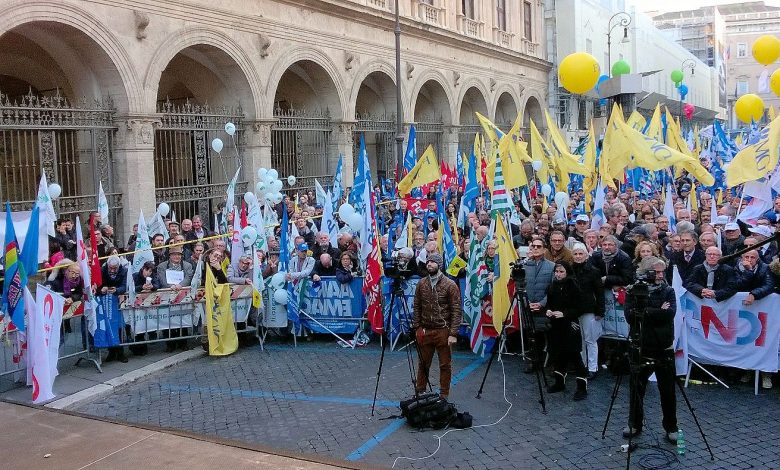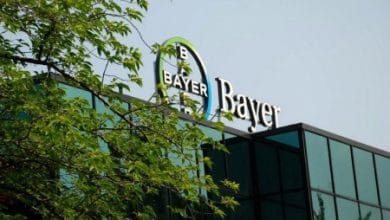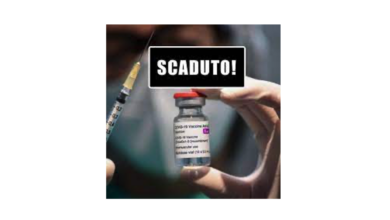
Chronicle of an event not to be forgotten. Piazza SS.Apostoli is one of the most beautiful squares in Rome. Seeing it on Saturday afternoon, November 28, full of doctors and dentists is something unforgettable. In the square many Order Presidents, many CAO Presidents, many doctors and dentists from all over Italy. All the medical union initials are present. We haven't seen something like this since October 27, 2011. Then it was a procession from Piazza della Repubblica to the Colosseum. This year the permanent demonstration was chosen, with a stage where various interlocutors took turns bringing their own testimonies.
The President of FNOMCeO Roberta Chersevani, in opening and concluding the event, underlined above all one concept: "The dignity of the profession has taken to the streets". And then he retraced the stages that led the doctors to this point of the protest and recalled the salient points of the platform which is the basis of the mobilization (it can be consulted on the portal). Chersevani then reiterated: “We want to be institutional interlocutors of the Government and Parliament. Everyone must understand that doctors are a civil and social value of the country".
For his part, the National President of the CAO Giuseppe Renzo increased the dose by speaking of the discomfort and the reasons for the protest of the medical and dental world. "Enough. We no longer want healthcare in pieces, with 21 different healthcare systems. Government and Parliament must respond, otherwise the protest will continue. We will not stop".
The demonstration could only be like this, on the positions stated by the FNOMCeO three days ago in a press conference. Positions on which there has been an extraordinary convergence on the part of all doctors and dentists who care about the National Health Service and oppose the repeated attempts at dismantling, which essentially mean a reduction in welfare, which risks becoming increasingly minimal. The profound conviction of doctors and dentists is that if we continue on the path of hitting the public health service, it means that we are in the presence of a regressive line on the part of the government, of a counter-reform of the health system.
From the testimonies of many doctors it has emerged that there is no sector of activity that does not experience problems and discomforts: family doctors, medical guards, hospitals, specialists, anesthesiologists in critical areas, young doctors dealing with long and difficult training courses and with the persistent difficulty of finding employment. If we then add Renzo's complaint about the difficulties of dentists, then the panorama is complete: we trudge day by day, we have to unravel between rules that sometimes conflict with each other, we have to fight against the ever more looming bureaucracy, with the real risk of losing an idea of the future. In Piazza SS. Apostoli spread thoughts of this type, shared by everyone, from the north to the south of the country, with a strong feeling of despondency and with the reasonable doubt that politics is not capable of listening to the reasons for a composed but firm protest. But there was also another belief widely shared by all in the square: the demonstration is a stage, the mobilization continues until there are adequate responses from the Government and Parliament.
Orpheus Notaristefano – Article published in: News – FNOMCeO
Doctors mobilized for November 28th, December 16th and beyond
FNOMCeO President Roberta Chersevani and Vice-President Maurizio Scassola illustrated the reasons for the protest at a press conference in Rome, which will continue in the absence of a confrontation with the Government. Maximum mobilization of doctors and dentists for the event that will take place on Saturday 28 November from 3 to 6 pm, in Rome, in Piazza SS. Apostles.
In a press conference held in Rome, the President of the FNOMCeO Roberta Chersevani recalled that "this point was reached after a broad discussion that started from the National Council of July 4, when we approved the document 'for a renewed alliance of doctors with citizens' and then in subsequent meetings when we stated that 'there is no progress in society without doctors'. We thus arrived at the States General of 21 October when we defined the NO and YES which are the basis of our action (NO to underfunding which leads to the dismantling of the NHS and the rationing of services to citizens. NO to the Profession governed by decrees and state protocols suggested by those who are far from daily relationships with people. NO to administrative obligations that take time away from relationships of care. NO to training that does not deal with health needs. NO to a policy hostile to doctors and little attention to the safety of care. YES to a Profession free to treat in a NHS that offers fairness and equal access opportunities YES to training aimed at health care needs and coherence between access to study, work and generational turnover YES to computerization that also offers opportunities for knowledge of health needs YES to peer review of professional behavior and to meritocracy.YES ethical with and for people). There is still a discrepancy between Medicine graduates and places available in specializations, with 23,000 young doctors unable to enter specialization. We do our mobilization -concluded Chersevani- for ourselves, but also for our clients, for the citizens”.
Vice-President Maurizio Scasola recalled that "We need a profound reform of the system and of the profession. It is evident that alongside the person, alongside the citizen, there must be the presence of the doctor and health personnel. The insurances must be supplementary and not substitute for the NHS. The positive thing for the profession, at this stage, is that the trade unions are all together in the FNOMCeO, with an extraordinary compactness. We see, in a close perspective, that the alliance between doctors and citizens takes the form of the establishment of an Observatory between the FNOMCeO and the associations of citizens and patients”.
Several representatives of the trade union world underlined the positions and motivations on which the demonstration on 28 November is being held. The risk of a dismantling of the NHS was strongly denounced by Giacomo Milillo (FIMMG), Ricardo Cassi (CIMO), Costantino Troise (ANAAO). According to Milillo, “we are witnessing a demobilization of the NHS at the expense of the citizens: now there is a downward compression and the middle class is giving up treatment, while more and more citizens are paying for services no longer provided by the NHS. The real alarm to raise is this”.
According to Troise, "a strategy is underway, on the part of politics, which aims to reduce everything: in financial, professional and structural terms. And the doctor becomes the scapegoat. As many as 13,000 doctors are about to retire, with the risk of a crisis in the system. It is good that life expectancy has increased, but we would like people to live longer but in good health. Instead, the number of citizens who pay for their own treatments is increasing: private spending on health now stands at 33-34 billion a year. This is reality”.
FNOMCeO and medical unions therefore go to the demonstration on 28 November having clear the global scenario of health and the country. There is nothing corporate in this approach, but the awareness that problems can only be solved with a serious dialogue with the Government. “Even on a constitutionally relevant issue such as the reform of Title V, we want to be heard and not just heard, and even in this there is a big difference”, Chersevani specified. When asked how to proceed in the event of silence from the Government, the answer was clear and dry, from everyone and can be summarized as follows: "Meanwhile we go to the demonstration on 28, meanwhile the strike has already been called for 16 December, if nothing happens, the mobilization will continue beyond 16 December”.
Orfeo Notaristefano – FNOMCeO News
Milillo (Fimmg): Regions have betrayed us, the chaos is due to them
“ We think that at the moment there is chaos due to the transfer of the powers of the National Health Service to the Regions, to an absent policy on the part of the government and to the ministry's reliance on science. A betrayal, therefore, against the professionals who guarantee assistance every day”. This was stated by Giacomo Milillo, interviewed by the Dire agency on the occasion of the press conference to present the doctors' event, which will take place in Rome on Saturday 28 November.
We think that at the moment there is chaos due to the transfer of the powers of the National Health Service to the Regions, to an absent policy on the part of the government and to the ministry's reliance on science. A betrayal, therefore, against the professionals who guarantee assistance every day”. This was stated by Giacomo Milillo, interviewed by the Dire agency on the occasion of the press conference to present the doctors' event, which will take place in Rome on Saturday 28 November.
The appointment is from 3 to 6 pm, in Piazza Santi Apostoli.
“Our interlocutor, by now - he continued - is the government: we have set aside the Regions. In fact, we have had relations and dialogue with the Regions for decades, without however having seen any results. Not even they know exactly what they want to do, apart from trying to recover as many resources as possible for their budgets”. In the meantime, Saturday's demonstration is “a mobilization of the entire medical profession - explained Milillo - above all to defend citizens' right to health. We are recording a maintenance of the levels necessary for health protection through a strong integration of private spending. The results, therefore, are less and less due to the National Health Service and more and more at the citizen's expense”.
And this, as the years progress, added the national secretary of Fimmg, can “make citizens discover, when they run out of money, that they no longer have a national health service. At that point the rich will buy insurance - he concluded - while the poor will be left without assistance".





